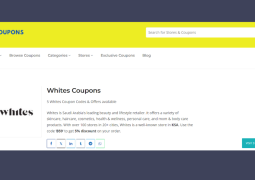Domain Versus Social Media
by 18/05/2022 09:420

If you are a business, you may be wondering whether to invest in social media or web domains – this can be a tough decision.
This post compares and contrasts the two, so you can make an educated decision about which one will be best for your business.
Domain Vs. Social Media: The Basics – What are They?
Domain (Website)
A website is an online location that contains information about your business, products, or services.
Domain Names
A domain name (also called a website address) is the URL users type into their browser when they want to visit your site. For example, when someone types in www.example.com into their browser, they can view your site. A domain name is an essential piece of online real estate because it tells people what your site is about and where it resides online so that they can find it easily.
Social Media
Social media is a form of online communication that allows users to share content through virtual communities and networks. Popular social media sites include Facebook, Instagram, Twitter, and YouTube.
Domain Vs. Social Media: Pros and Cons
The reality is that both are important for different reasons, and each plays an integral role in your overall marketing strategy. Let us take a look at some of the pros and cons of each:
Social Media Pros
It is Free to Get Started
You don’t have to pay anything for these platforms unless you want to pay for advertising or other features within the platform itself (like customizing your page).
It is Easy
Anyone can join these platforms and start posting content immediately. There is no training required, unlike many traditional marketing strategies such as direct mail or print advertising, where you need much training before being able to use them effectively.
Wide Reach
With over 2.9 billion people on Facebook alone and over 3.6 billion on all social media platforms combined as of 2020, more people than ever before can potentially see your posts and engage with them when using social media. This characteristic of social media gives businesses access to a whole new audience that they would not have had otherwise without this medium available to them.
It Allows you to Target Specific Demographics
Social media sites allow you to segment users based on their age, gender, location, interests, etc., to better target your audience.
Branding and Positioning
Social media is one of the best ways to build your brand online, especially if you have an active voice in the community or industry where you operate. For example, if you run a startup that helps businesses automate their social media presence, having a solid presence on Twitter can help position yourself as an authority in this area, leading to more business opportunities (i.e., partnerships with more prominent brands).
It Allows you to Interact with Customers and Prospects in Real-Time
This social media feature is a massive advantage over traditional marketing such as print ads or direct mail, where it can take weeks or even months for prospects to respond. In social media, you can often get feedback on your posts in less than 24 hours, giving you instant feedback on how effective your messaging is with consumers.
Personalization
Social media allows you to reach out and connect with people more personally. It helps build trust and rapport with existing clients and attract new ones.
Social Media is Excellent for Customer Service
It gives customers an avenue to voice their concerns and ask questions directly from a brand representative without contacting customer service representatives. Social media is all about engagement and interaction with others – it is excellent for building relationships that may lead to referrals, networking connections, and other business opportunities down the road.
Social Media Cons
Lack of Control Over Content
With social media, you have less control over what is published on your page (and sometimes, even less control over who sees it). You also do not have as much control over how people interact with what you post.
Deplatform Risk
If you rely solely on social media for marketing purposes (and not other channels), losing access to your account could be disastrous for your business, especially if you have tons of followers who would lose access to your content.
Design Constraint
One of the main disadvantages of social media is that you have very little control over the design of your page or profile. You can change it up a bit, but ultimately it is out of your hands. Let us say you want to create an image that represents your brand: well, social media platforms like Facebook and Twitter require square dimensions, which means you can’t use an excellent, wide banner ad design. Instead, you are forced to create something small and squished together – that does not leave much room for creativity which can hardly be ideal! You have complete control over everything from colors and graphics to the fonts and layout of a website.
Discovery Problems
It can be difficult for new businesses to get noticed or gain traction on social media sites because millions of other brands are vying for attention from consumers in crowded categories like travel or retail. So how do you make sure that people see your content? There is no easy answer here – it is just about being consistent and persistent in sharing posts that resonate with your audience over time (which we will talk about later).
The Pros of Owning Your Domain
You Own it
Unlike social media, you are not dependent on anyone else’s platform. You can use your domain to build up your brand and generate income from the content you create on it.
Similarly, You own all the content too. When using social media, you do not own all the content on your page or post, which can be a pain if someone uses it for their gain.
You can Track Analytics
If you are using a social media channel like Facebook or Instagram, you are limited to the information you can get. For example, on Facebook, you can see how many people saw your post and how many people clicked on it. But if you want more information than insights from social media platforms, then having your domain is better. You can track more data and see what works and does not improve over time with a website.
It is More Professional
Your domain name makes you appear more professional and credible to potential customers. You cannot deny that perception is a currency in business. It’s essential to present yourself as the most professional version of yourself, which make your business appear more established and trustworthy than if you were using a subdomain such as “facebook.com/mybusinessname” or “youtube.com/mybusinessname,” which could be changed at any time by social media websites without notice!
It’s Memorable
A memorable domain name is a good thing. It makes it easier for people to remember you and your business. It also helps you stand out from the crowd, which can be helpful if you’re trying to build a brand or get found in search engines.
Complete Control
You can easily edit your website, add content, and make changes whenever you want to. You are also the only one who has access to the site. If you own your domain, you have complete control over what happens to it. You can change the name servers, move your site to another host or even sell it. You can do this all without having to ask permission from anyone.
Additionally, you can customize your website however you want. Your website is an extension of your brand, so make sure it reflects who you are and what you do. Customization options vary from platform to platform, but this is one advantage of owning your domain – there is no limit on what you can do!
Finally, You control how users interact with the content. The platform’s user interface generally limits content on social media sites. You can also do more than share text-based posts and images with your website. You can create interactive features that allow users to engage with you in new ways and create a customized user experience that gives visitors exactly what they want and needs.
Search Engine Optimization (SEO) Benefits
When people search for information about your business on Google or other search engines, they will see your site. A custom domain makes it easier for search engines like Google to find your website, which means more traffic for you and a better ranking in search results for keywords related to your blog or business – this can increase sales for your business.
If you want to get ranked as high as possible on Google, Facebook, or any other social media platform, keep in mind that these platforms are not set up to optimize this type of content the same way that people optimize a website. If your main goal is organic traffic through SEO, having your domain might make more sense than ranking on social media platforms like Facebook, Twitter, or Instagram.
Offers more Marketing Opportunities
Following is an interesting quote:
“Allow for many paths to your goal. Do not fixate on one path, because then you are likely to give up when that path is blocked.”
How does this relate to the point at hand?
We will explain:
It is about having multiple channels to present your brand in a new and engaging way to reach your audience or through which people can find you.
You can create a blog to share your expertise and knowledge using your domain. You can also create an email newsletter where you send exciting information about your field of work. And if you sell products, you have the option to create a shopping cart and start selling right away!
Other Marketing Possibilities:
Using Subdomains
The great thing about having your domain is that it allows you to create subdomains. Marketing benefits of subdomains include: separating different categories within one website this way, so visitors will not get confused by seeing too many things all at once on one page; targeting more regions and languages using specific subdomains.
If you are interested in knowing more subdomains similar to your domain name, you can check this tool https://subdomains.whoisxmlapi.com/ which will help you Instantly get a complete list of subdomains with relevant update dates.
Creating landing pages for Specific Products or services
Social media pages are great, but they do not offer as much flexibility as having your domain name where you can create targeted landing pages.
Cons of Having Your Domain
Initial Cost
Setting up a website is a big deal – it requires more time to create a website than just creating a profile on a social media site. You need to buy the domain name, register it with the registrar, and pay for hosting. And if you can’t build one yourself, you will have to pay for that.
Maintenance
Once you get everything set up, there will be regular maintenance costs. You need to make sure that your site is secure and up-to-date. It is not as simple as just having a Facebook page or Twitter account where you can ignore them for months and still have people coming back every day.
Domain Vs. Social Media: The Verdict – Which One should You Choose?
Let’s face it. Social media is a great way to get your brand out there and make it easy for people to find you. However, it can not do everything that a website can.
The bottom line is this: Your business needs both domain and social media.



